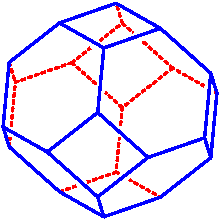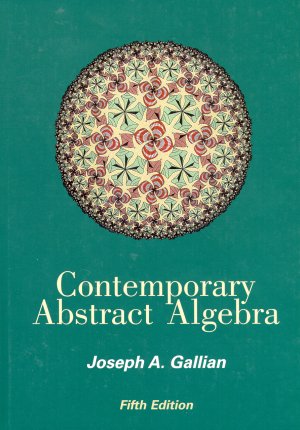In-term homework counts 30%, with a final homework set 10%.
This Course
Abstract Algebra has its origins in the number theory of antiquity,
and arose as a subject in the late 18th Century as a tool to help
to understand the zeroes of polynomials.
From these origins, it has grown mightily and now it
pervades much of modern pure mathematics.
Curiously, this formerly purest of pure disciplines has become rather
practical.
Simply put, abstract algebra underlies the security and integrity of all
modern digital communication.
Our course is not about the uses of abstract algebra in digital
communication.
Its goal is to introduce you to the mathematical methods of
inquiry (definition, conjecture, and proof), and train
you in the rigor of thought that is unique to
mathematics.
The vehicle for this will be our study of the elementary properties of
groups, a mathematical structure that
encapsulates the idea of symmetry.
A key role in this course will be played by your homework, which will serve
as a dialog between us.
Homework is assigned daily and collected at the beginning of the next class
period.
Late homework is not accepted.
Homework will be graded promptly (by Frank)
and returned the following class period.
Your homework write ups are expected to represent your
own work and should
be carefully and neatly written.
An important part of your education is learning from your peers.
I encourage you to discuss problems with others in the class, but the
problem write ups must be your own
(n identical solutions will each
receive 1/n of the credit).
The key component of careful thought is recognizing and
communicating
correct arguments, while avoiding false statements.
Accordingly, full credit will be given for well-written, correct solutions
that are unblemished by false assertions.
Partial credit will be given for partial solutions (that are correct), but
false statements will be given
negative partial credit.
Abstract Algebra, like other advanced mathematics courses requires students
to be engaged in classroom discourse.
To encourage class participation, good questions will be rewarded with
specially prepared coupons (on post-it notes), which may be redeemed for
extra credit.
The individual value of the coupons will be determined later.
It will be neither trivial nor extravagant.
I have four office hours scheduled each week.
The times can be changed (except that Wednesday is off limits).
Appointments may be made, as well.
The most reliable way to contact me is via email - I read and respond to
it whenever I am in my office.
Due to professional commitments, I will miss the following class
sessions:
14 February (6th lecture), 14 March (13th lecture), 9 and 11 April (18th &
19th lectures).
Substitutes will be found for those dates.
In addition, there will be several evening sessions of our class (with
pizza) for additional review or tests.
This will be discussed among us and planned as the need arises.
Challenge:
What are these?
|
| |
a | b | c | d | e | f |
|---|
| a | e | c | b | f | a | d |
|---|
| b | d | f | a | c | b | e |
|---|
| c | f | d | e | b | c | a |
|---|
| d | b | a | f | e | d | c |
|---|
| e | a | b | c | d | e | f |
|---|
| f | c | e | d | a | f | b |
|---|
| |
| | a | b | c | d | e | f |
|---|
| a | c | f | a | e | d | b |
|---|
| b | f | d | b | c | a | e |
|---|
| c | a | b | c | d | e | f |
|---|
| d | e | c | d | b | f | a |
|---|
| e | d | a | e | f | b | c |
|---|
| f | b | e | f | a | c | d |
|---|
|
TOP
Last modified: 7 May 2002 by Frank Sottile




 (LaTeX)
(LaTeX)
 Exam 1
Exam 1 Exam 2
Exam 2 Exam 3
Exam 3  No Final
No Final 

 (LaTeX)
(LaTeX)